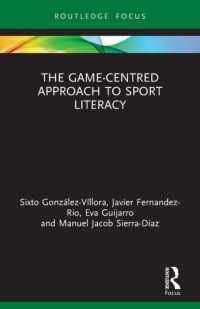- ホーム
- > 洋書
- > 英文書
- > Business / Economics
Full Description
Whilst there are many types of agri-food supply chain, all face growing pressures to improve safety, efficiency, equity, environmental and health impacts for chain actors and consumers.
Frontiers in agri-food supply chains: Frameworks and case studies takes a considered approach to detailing the recent developments across the sector which support the changing demands placed upon agri-food supply chains, including the emergence of digital technologies to ensure a sufficient supply of safe, high-quality food. The collection highlights the need to assess the performance, infrastructure and governance of agri-food supply chains and provides detailed case studies from several regions around the world to demonstrate examples of improved performance.
In its comprehensive exploration of agri-food supply chains, the book succeeds in highlighting the fragility of our global food system and ways to improve the resilience and efficiency of agri-food supply chains.
Contents
1.Studying agri-food supply chains: an analytical framework: Sander de Leeuw, Renzo Akkerman and Rodrigo Romero-Silva, Wageningen University, The Netherlands;
Part 1 Food supply chains in different regions
2.Agri-food supply chains in the United States: Tobias Schoenherr, Grant Kanak, Amy Montalbano and Sneh Patel, Michigan State University, USA;
3.Agri-food supply chains in Western and Northern Europe: Michael Bourlakis and Emmanuel Sawyerr, Cranfield University, UK;
4.Agri-food supply chains in Southern and Eastern Europe: F. J. Peña Rodríguez, University of Granada, Spain; C. Yacamán Ochoa, Autonomous University of Madrid, Spain; and A. Matarán Ruiz, University of Granada, Spain;
5.Agri-food supply chains and food security in Asia: Jose Ma. Luis Montesclaros and Paul S. Teng, S. Rajaratnam School of International Studies, Nanyang Technological University, Singapore;
Part 2 Assessing agri-food supply chain performance: Tools and techniques
6.End-to-end performance measurement systems for agri-food supply chains: Lusine Aramyan, Wageningen University and Research, The Netherlands; and Jos van Iwaarden, Kearney, The Netherlands;
7.State of the art in agri-food supply chain infrastructure design: Müge Çerçi, Kocaeli University, Turkey; Zehra B. Kanık, Cankaya University, Turkey; Sibel Erişkan, Burdur Mehmet Akif Ersoy University, Turkey; and Mehmet Soysal, Hacettepe University, Turkey
8.Planning and control in agri-food supply chains: Florian Cramer and Sandra Transchel, Kühne Logistics University, Germany;
9.Information and communication technology in agri-food supply chains: Gerhard Schiefer, University of Bonn, Germany;
Part 3 Performance improvement in agri-food supply chains: Case studies
10.Improving agri-food supply chains in North America: the case of the sugarcane agro-industry in Mexico: José Luis Solleiro and Rosario Castañón, National University of Mexico (UNAM), Mexico;
11.Supply chain resilience capabilities in European food supply chains: the impact of COVID-19 in the Netherlands: Renzo Akkerman and Rene Haijema, Wageningen University, The Netherlands; Marvin Kunz, Wageningen Economic Research, The Netherlands; Sander de Leeuw, Wageningen University, The Netherlands; Viet Nguyen, Wageningen University/ Amsterdam University of Applied Sciences, The Netherlands; and Harmke Schellekens and Gideon van der Stelt, Wageningen University, The Netherlands;
12.Improving agri-food supply chains in Africa: Danie Jordaan and Thabile Tsabedze, University of Pretoria, South Africa;
13.Improving agri-food supply chains in Asia: Yijun Li, China Agricultural University, China and Wageningen University, The Netherlands; and Ting Meng, Jingjing Wang, Lu Liu, Mo Li, Xin Zhang and Wen-Feng Cong , China Agricultural University, China;
Part 4 Conclusions
14.Understanding and improving global agri-food supply chains in an interconnected world: a systems approach: Rodrigo Romero-Silva, Renzo Akkerman and Sander de Leeuw, Wageningen University, The Netherlands;








